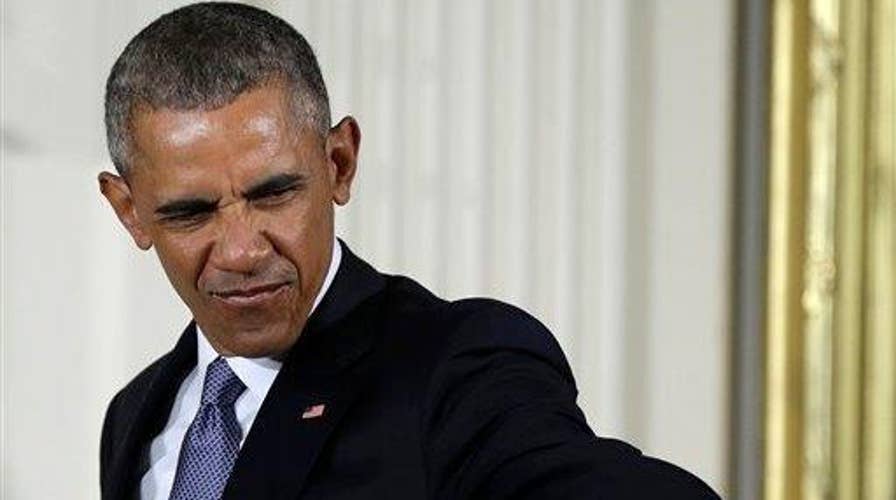Critics fault Obama admin. for ignoring red line violations
Jennifer Griffin reports from the Pentagon
The White House no longer talks about “red lines,” but it seems more are being crossed every day.
From the Middle East to Asia, U.S. adversaries are taking provocative and aggressive actions, raising concerns they are feeling emboldened – ever since President Obama backed off the threat of military action against Syria’s Bashar Assad.
North Korea has now tested a fourth nuclear device under orders from Kim Jong Un. China over the weekend brazenly landed its first aircraft on a runway built atop one of its man-made islands in the South China Sea weeks after the U.S. indicated it had no plans to send warships there, and later flew a large civilian airliner to the artificial land mass.
The Pentagon confirmed Thursday that three Chinese planes have landed on the disputed island chain in recent days.
“We can now confirm that there may have been three flights that have landed,” Pentagon Press Secretary Peter Cook told reporters. “We clearly are concerned by these flights.”
He would not say if the Pentagon planned to respond.
Many at the Pentagon fear the disputed islands will be used as a military base that could threaten maritime security.
But House Speaker Paul Ryan pointed the finger at the administration, blasting the president for talking of cutting the Navy as tension builds in the South China Sea.
"This just shows that we need to have a strong Navy," Ryan told reporters. "We should not have a president proposing to lower our ship count to pre-World War I levels. This means we need to have a strong military and a strong Navy, and a real foreign policy, which we do not now have."
More broadly, former administration officials have spoken out about the damage done to U.S. credibility after the president in 2013 reversed calls for military action when Assad used chemical weapons.
“Once that line is drawn and once it is crossed, the commander-in-chief has the responsibility to act,” former Defense Secretary Leon Panetta said in an MSNBC interview Thursday. “It sent the wrong message that America will not stand by its word.” Panetta also served as Obama’s CIA director.
In response to China’s latest moves, Secretary of State John Kerry spoke with his Vietnamese counterpart.
"Both sides expressed concerns about potential militarization of outposts in the Spratlys and agreed that these activities continue to raise regional tensions,” State Department spokesman John Kirby said.
Kerry also spoke with his Chinese counterpart, about the South China Sea but also about North Korea’s aggression.
“We cannot continue business as usual” with North Korea, Kerry told reporters Thursday.
A senior State Department official made clear the U.S. is looking to China for help with Pyongyang: “We look for China to lead here.”
Otherwise, there has been relative silence from the White House and Pentagon.
In October, the Pentagon sent the USS Lassen, a Navy destroyer, to sail within 12 miles of the Spratly Islands to make a point, but the Chinese have ignored such symbolic moves knowing the White House is unlikely to authorize anything more muscular.
Earlier this week, the Pentagon refused to even confirm the Chinese flights, referring all questions about them and North Korea’s nuclear test to the State Department.
"I can't confirm flights from here. I've seen reports of those flights,” Pentagon spokesman Peter Cook told reporters.
Despite the low-key response, a 2006 opinion piece penned by now-Defense Secretary Ash Carter in the Washington Post argued for preemptive action to deter countries like China, North Korea and Iran.
"Should the United States allow a country openly hostile to it and armed with nuclear weapons to perfect an intercontinental ballistic missile capable of delivering nuclear weapons to U.S. soil? We believe not,” Carter wrote in a piece with William Perry, a former defense secretary. “The Bush administration has unwisely ballyhooed the doctrine of ‘preemption,’ which all previous presidents have sustained as an option rather than a dogma."
Last week, the White House also delayed a decision to impose new sanctions on Iran in the wake of a second ballistic missile test this fall in breach of U.N. Security Council resolutions. The administration still won't confirm publicly that a November missile test took place.
“There are still some technical issues that are being worked out,” Kirby said of the sanctions, pledging the issue would not be ignored. “As we have in the past, I fully expect you'll see us in the future continue to hold Iran accountable for these other destabilizing activities.”
Seven Democratic House members wrote to the president Wednesday demanding a response.
“Inaction from the United States would send the misguided message that, in the wake of the JCPOA [Iran nuclear deal], the international community has lost the willingness to hold the Iranian regime accountable,” they wrote.
The letter was signed by Rep. Debbie Wasserman Schultz, D-Fla., chairwoman of the Democratic National Committee, and six other Democrats.
In addition, an Iranian rocket fired by Iran's Islamic Revolutionary Guards Corps during live-fire exercises came within just 1,500 feet last week of the USS Harry S. Truman after it passed through the Strait of Hormuz.
“Such aggressive and destabilizing behavior is deeply troubling, particularly preceding implementation of the Joint Comprehensive Plan of Action (JCPOA), and demands a U.S. response,” the Democratic lawmakers wrote to Obama.
Speaking about the Iranian nuclear agreement, Kerry said Thursday the deal might be implemented very soon, unfreezing billions of dollars in sanctions relief.
“We are days away from implementation if all goes well,” Kerry said.













































